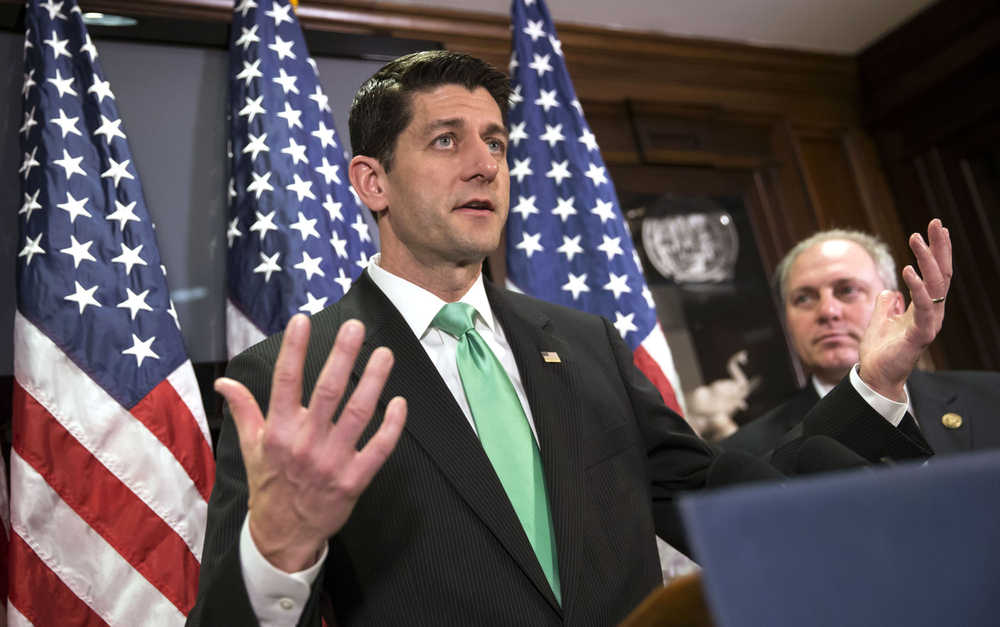WASHINGTON — Dealing an embarrassing setback to House Speaker Paul Ryan, tea party conservatives are blocking a leadership-backed budget plan as the candidacy of GOP front-runner Donald Trump stokes anxiety among congressional Republicans facing an angry, anti-Washington electorate.
The move by the House Freedom Caucus, the same band of conservatives that toppled Ryan’s predecessor, John Boehner, would mean that the House would fail to pass a budget for the first time since Republicans reclaimed control of the chamber in 2011. For years, the GOP attacked Senate Democrats for the same failure.
Ryan, R-Wis., cited “all of the anxiety that’s coming to a crescendo in this country” for the reluctance of conservatives to endorse the budget plan, which calls for higher agency operating budgets as agreed to in last year’s budget deal with President Barack Obama.
The fiscal blueprint, released Tuesday by Budget Committee Chairman Tom Price, R-Ga., relies on eliminating health care subsidies and other coverage provided by Obama’s health care law, sharp cuts to Medicaid, and reprises a plan devised by Ryan years ago that would transform Medicare into a voucher-like program for future retirees. A deteriorating fiscal picture required Price to propose deeper cuts than ever before.
The annual budget debate gives lawmakers of all stripes a chance to weigh in on the nation’s fiscal woes. The government borrows about 16 cents of every dollar it spends and faces a potential debt crisis at some point if Washington’s warring factions don’t address the problem.
As in past years, GOP leaders have no plans to implement the severe cuts recommended by the nonbinding blueprint.
Instead, the main goal of the budget is to set in motion the annual appropriations process, in which the 12 spending bills that set agency operating budgets are produced. That’s the $1.1 trillion “discretionary” portion of the $4 trillion-plus federal budget that is passed by Congress each year.
Many conservatives oppose the additional $46 billion or so in higher spending that the deal with Obama permits for the upcoming round of appropriations bills for the 2017 fiscal year starting Oct. 1; it comes on top of about $66 billion in higher spending for the ongoing budget year.
In sum, conservatives are tired that sweeping budget cuts are never implemented while Obama prevails on more money for agency operating budgets. A plan to advance real spending cuts along with the nonbinding budget targets didn’t win over many tea party converts, in part because it’s plain the cuts wouldn’t make it through the Senate.
“There are a number of us struggling with it,” said Rep. Mark Sanford, R-S.C. “Savings that are an illusion are not savings.”
The debate comes as outsider presidential candidates like Trump and Sen. Ted Cruz of Texas are roiling the GOP electorate with an anti-Washington message. Approval ratings for lawmakers remain near all-time lows and many conservatives fear casting House votes that could alienate the ardent conservatives that dominate the Republican Party.
“We’re the body of government that’s closest to the people. We’re up for election every other year,” said Ryan. “And there’s just a lot of anxiety that’s out there.”
The Freedom Caucus announced Monday night that it won’t support the budget measure. The move by the bloc of about three dozen conservatives reflects enduring opposition from tea party lawmakers to budget and debt deals with Obama.
“House leadership has continually asked the Republican conference to support President Obama’s budget levels, even though the national debt passed the $19 trillion mark in January,” said a Freedom Caucus statement.
Although Republicans have a sweeping majority in the House — 246 to 188 — the loss of about 20 of those conservatives would make it impossible to pass a budget. Every Democrat is sure to oppose the measure.
Price is nonetheless pressing ahead with a panel vote Wednesday on the 10-year measure, which relies on huge spending cuts — $6.5 trillion over the coming decade — to demonstrate that the budget can be balanced.
“Surrendering to the status quo or failing to act boldly will mean Americans today and in the future will have less opportunity and less security,” Price said in a statement.
Democrats blasted the measure for proposing cuts deeper than any of their prior plans.
“This Republican budget takes a sledgehammer to America’s competitiveness and working families” said top Budget Committee Democrat Chris Van Hollen of Maryland. “It’s a budget that helps the rich get richer while everyone else feels like they’re running in place or falling behind.”
GOP-led committees are moving ahead with a more modest series of spending cuts.
The Senate may skip the budget debate altogether and instead go straight to the annual spending bills under a little-noticed provision added to last year’s bipartisan deal that permits the shortcut.

